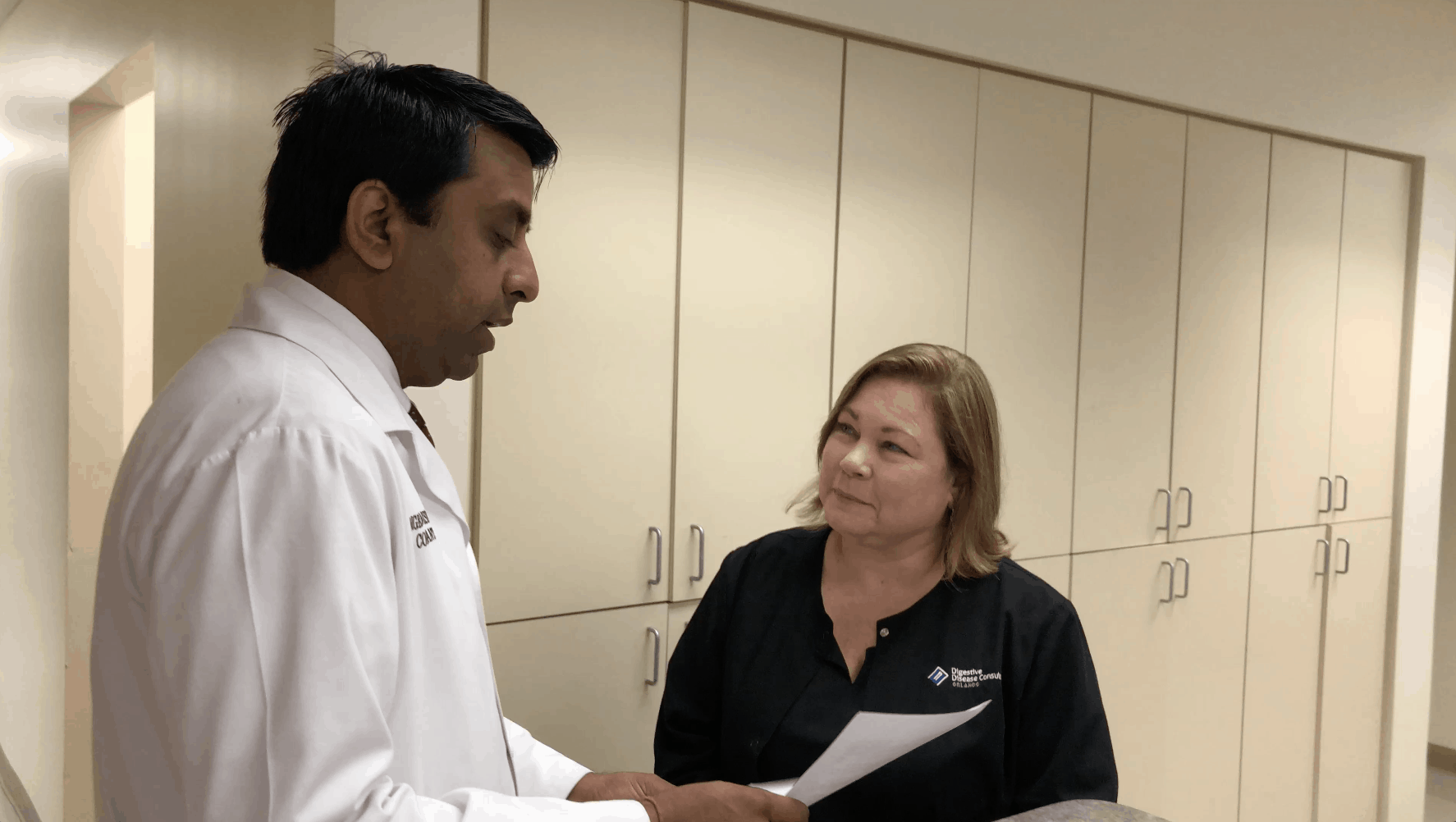- What are the symptoms of irritable bowel syndrome?
- How is irritable bowel syndrome diagnosed?
- What is the treatment for irritable bowel syndrome?
- When should I see my doctor?
Irritable bowel syndrome (IBS) is a disorder of the GI tract that is characterized by diarrhea, constipation, or both and is associated with abdominal pain, according Dr. Raaj K. Popli, M.D., an internal medicine and gastroenterology specialist at Digestive Disease Consultants in Orlando.
The International Foundation for Gastrointestinal Disorders (IFFGD) says IBS affects between 25 and 45 million people in the U.S. While the exact cause of the disease isn’t known, there are ways to treat this uncomfortable illness.
What Are the Symptoms of Irritable Bowel Syndrome?
Your stomach has been feeling uncomfortable, you’re bloated, and you’ve had sharp or mild pain in your abdomen. You may have heard of IBS but don’t understand what it is or if you have it.
IBS is a chronic problem that is mild to highly uncomfortable causing:
- Abdominal pain that is intermittent and “crampy”
- Bloating and gassiness
- Changes in your bowel movements
- Diarrhea or constipation – or both
- Intolerance to certain foods
- Irregular bowel movements
IBS causes dysfunction of the gut. The American College of Gastroenterology (ACG) says, “IBS is best defined by what it is NOT.”
According to ACG, the following conditions rule out irritable bowel syndrome:
- Structural or anatomical issue
- Identifiable chemical or physical disorder
- Cancer
- Precursor to other gastrointestinal diseases
- Something you have to live with
There is no absolute diagnostic test for irritable bowel syndrome. The purpose of laboratory testing is primarily to exclude an alternative diagnosis.
It is important to go through the testing process to get to the bottom of your symptoms. Be patient. Some of the testing may be inconclusive at first. This is a process that your doctor will work closely with you on.
Irritable bowel syndrome can have a profound effect on the lives of the people affected by the disease. The constant need to use the restroom can cause some people to limit their interactions and social activities. They may skip meals or make changes to their diet. The pain and discomfort of the disease can cause people to miss work or lose productivity. As a result, the disease can have a negative impact on the health and life of the person affected.
How is Irritable Bowel Syndrome Diagnosed?
 Dr. Popli calls diagnosis of the disease an “exclusion” process. Doctors focus first on ruling out other diseases of the digestive tract before coming to the diagnosis of irritable bowel. Your doctor will follow an exam and health history with a number of tests to rule out other ailments. These tests could include:
Dr. Popli calls diagnosis of the disease an “exclusion” process. Doctors focus first on ruling out other diseases of the digestive tract before coming to the diagnosis of irritable bowel. Your doctor will follow an exam and health history with a number of tests to rule out other ailments. These tests could include:
- Blood tests
- Colonoscopy
- Hydrogen breath test
- Stool tests
- Upper GI endoscopy
Stress and anxiety don’t cause irritable bowel syndrome, but they can cause the disorder to flare up. The truth is that we don’t know exactly what causes irritable bowel syndrome. Dr. Popli says,“It’s a common misnomer that IBS is associated with things like colon cancer or vitamin deficiencies. That’s actually not true.”
Once a diagnosis has been given and all other disorders ruled out, it’s time to consider treatment for irritable bowel disease.
What is the Treatment for Irritable Bowel Syndrome?
There is no cookie-cutter, one-size-fits-all treatment for this complex disease. Dr. Popli says, “The treatment is variable,” for IBS. Working closely with your doctor, you can find a way to manage your symptoms. For some people, just altering their diet and stress can alleviate some of the symptoms. Usually, there are several approaches that end up helping the patient manage the disease. They could include:
- Adding fiber to the diet
- Changing the diet or eating habits such as meal size
- Probiotic supplements
- Restricting certain foods such as carbonated drinks or gas-producing vegetables
- Using the FODMAP diet to eliminate certain carbohydrates from the diet
Since flare ups of the disease seems to be tied to certain foods, keeping a food diary to help track what you eat and how you feel afterward is very important. Research also shows that getting more sleep, exercising, and reducing stress are all keys to eliminating symptoms.
There are over-the-counter medications to combat diarrhea or constipation that typically comes with an irritable bowel. Your doctor may also prescribe medications to help with the condition such as:
- Antibiotics like Xifaxan which are specifically for irritable bowel
- Antispasmodics to lessen the cramping and abdominal pain
- Herbal supplements like coated peppermint oil capsules
- Hypnotherapy or psychotherapy can help with triggers such as stress
- IBS-specific medications such as Linzess or Amitiza
The medications prescribed will be specific to your symptoms, for example, treating IBS with diarrhea symptoms would warrant medications such as Xifaxan. To treat irritable bowel syndrome with symptoms of constipation, your doctor may prescribe Amitiza.
When working with your doctor, you may try a number of different therapies alongside an elimination diet, to try to figure out what is causing your symptoms. The reality is that, while this disorder is very common, the treatment that will work must be suited for each individual that struggles with the disease.
When Should I See My Doctor?
 If you’ve been trying to live with the diarrhea, gas, bloating, cramping, and/or constipation, you don’t have to. See your doctor as the first step toward getting this uncomfortable and life-limiting disease under control.
If you’ve been trying to live with the diarrhea, gas, bloating, cramping, and/or constipation, you don’t have to. See your doctor as the first step toward getting this uncomfortable and life-limiting disease under control.
If you’ve been diagnosed with irritable bowel syndrome you’ve likely gone through an ordeal, ruling out other illnesses, suffering the pain of IBS, and then weeding out triggers that cause the disease to flare. Irritable bowel syndrome is a long-term condition that does not lead to other disorders.
However, whether you’ve been diagnosed or haven’t seen your doctor yet, there are some red flags to watch for, including:
- Fever or vomiting
- Rectal bleeding
- Unexplained weight loss
All of these could be signs that you have a serious medical condition so you should see your doctor right away.
